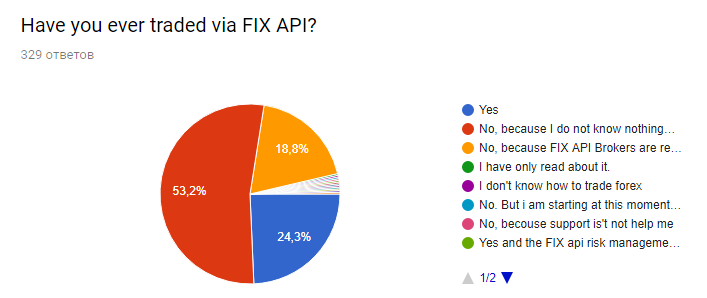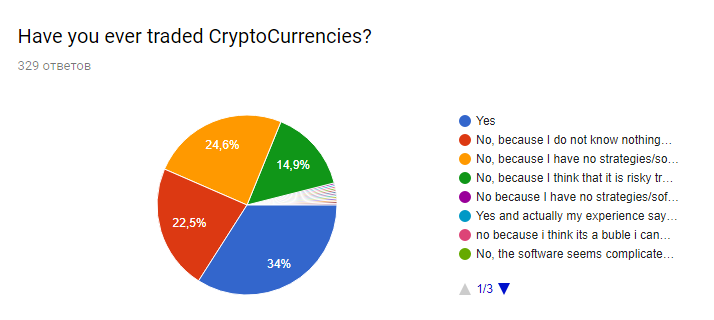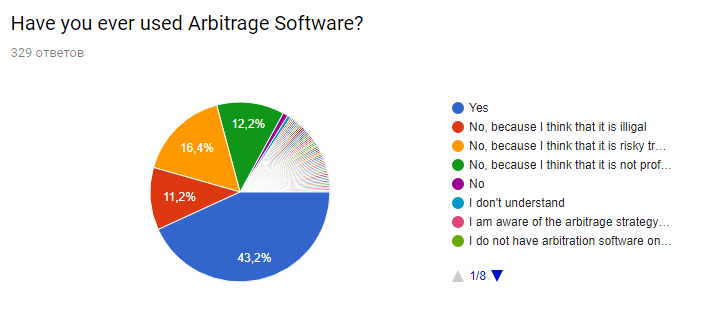First of all, I’d like to thank those of you who took the time to respond to our three questions. Your feedback is extremely important to us and helps us to provide you with the information that you need.
Have you ever traded via FIX API?
In response to our “Have you ever traded via FIX API?” question, more than 50% of the respondents selected “No, because I do not know anything about FIX API”.

This is something that many traders really need to work on. If you are serious about approaching the forex market as a place where you can make money consistently and not as you’d approach a casino, you will need to get familiar with FIX API. This should be a top priority – even more so, given that all the information is easily accessible and does not require any specialized knowledge. If you limit yourself to trading, there’s a good chance that you might end up being disappointed with your trading results, as you’ll find that most trading strategies simply don’t work. This is due to a number of reasons: slippage, slower execution times, filtered quotes, active dealing (i.e., broker manipulation), etc.
You can learn about FIX API by subscribing to our articles related to this topic. Additionally, if you have specific questions, we’ll be happy to address them.
More than 20% of the respondents answered this question in the affirmative. If you need help creating strategies for FIX API, we are ready to help you improve your results.
The third most popular response is “No, because FIX API Brokers require higher deposits than / brokers”. While this is true, a growing number of brokers are offering to open FIX API accounts for clients with deposits of $500 and lower. We encourage you to ask us for recommendations.
Have you ever traded cryptocurrencies?
Most respondents said yes, which shows that cryptocurrencies are now a part of our lives – and permanently so, we believe.
“No, because I do not know anything about cryptocurrencies”.

A cryptocurrency is essentially virtual money that is encrypted and protected with the help of algorithms. What sets cryptocurrencies apart from such payment platforms as PayPal is their decentralization and their independence from such institutional structures and hierarchies as banks and governments. Cryptocurrencies are facilitated by blockchain technology, which allows consistent cryptography of all trades.
What are cryptocurrency exchanges, and how do they work?
In practical terms, cryptocurrency exchanges are virtual platforms that allow users to trade cryptocurrencies or exchange them for other assets.
Many such exchanges support trading cryptocurrencies for fiat money or vice versa, although the scope of assets supported for trading varies one crypto exchange to another.
Trading one cryptocurrency for another is possible if the exchange has a corresponding pair that it supports. For example, if an exchange supports BTC/LTC, it means that bitcoins can be traded for Litecoins. If that currency pair is not displayed by the exchange, it means that you cannot do such a trade. The same applies to fiat money.
It is fairly easy to get set up to trade on a crypto exchange. The typical process is as follows:
1. Register. In most cases, registering on a crypto exchange is no different from registration on other websites.
2. Deposit funds for trading. Depositing crypto funds does not usually involve any fees, although it is more common for crypto exchanges to charge a fee when fiat money is deposited. Commission fees charged by crypto exchanges can be as high as 8%, although they usually fall within a range of 1-5%. The size of the commission fee depends considerably on the payment method used to deposit the funds: as exchanges are not inclined to pay commission fees levied by other payment systems, they usually add such commission fees to their own fees, which increases the size of the overall commission that has to be paid by the user.
3. Create an order to buy or sell a cryptocurrency. The user specifies the price at which the user seeks to buy or sell the cryptocurrency in question, and starts trading by placing the order in the general queue.
If there is a party willing to be on the other side of the trade at the requested price, then the trade is made. If the price is too far from the market, a counterparty might not be found. There might also be no counterparty if the cryptocurrency associated with the buy/sell order is highly unpopular.
Once the trade is done, the user can withdraw the funds from the exchange or keep them in the exchange wallet for future trading.
Trading can be done either manually or in automated mode through API, which brings us to the third most popular answer.
“No, because I have no strategies/software for cryptocurrency trading”.
We can help you create strategies for trading – you need only contact us.
“No, because I think that it is risky trading”.
Risk is a function of the strategy that is used. If you’re using short-term strategies for arbitrage purposes, your risk is practically zero. Long-term strategies are riskier, in my view, as cryprocurrency prices are volatile and can swing in either direction by 10-20% in a matter of hours. It doesn’t take a lot of time to make money with cryptocurrencies, but it doesn’t it take much time to lose money, either.
Have you ever used Arbitrage Software?
The respondents overwhelmingly said yes.
However, we were surprised by the second most popular answer: “No, because I think that it is illegal”.
We have written extensively about this topic. Every arbitrage strategy is legal. We encourage you to read the following article:
https://www.investopedia.com/articles/investing/032615/why-arbitrage-trading-legal.asp
“No, because I think that it is risky trading”.

This is a misconception. I can say with a high degree of certainty that this is the most profitable and least risky method of trading.
“No, because I think that it is not profitable now”.
I agree that many brokers try to hinder arbitrage trading and make money by trading in the B-book, but an increasing number of brokers are not trading against their clients. Although these strategies are broker-sensitive strategies, the performance results that you can achieve with them are likely to surpass your expectations.

